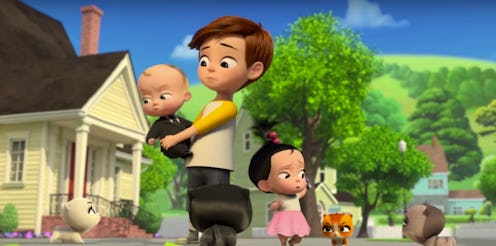Entertainment
There’s A ‘Boss Baby’ Spinoff On Netflix & Disney Fans Might Actually Love It

Following the success of DreamWorks' Oscar-nominated film The Boss Baby, Netflix has premiered a new animated spinoff entitled The Boss Baby: Back In Business. The series explores the ongoing adventures of Tim Templeton and his baby brother Theodore, who is also the boss of Baby Corp. However, fans of the original Boss Baby may have some questions about this series continuation — mainly, "why?" But Back In Business is the latest entry in a long-running trend when it comes to acclaimed animated films.
Boss Baby fans surely know that at the end of the original movie, the titular baby that is also a boss hangs up his baby tie, leaving Tim with a baby brother who is not a boss. However, the series ignores this ending, instead following Tim and Ted on various baby-related adventures, most of them revolving around the fact that cats are threatening to take over babies as the most loved thing on earth. The new show is not beholden at all to the plot of the original film and expands the world of the story in minor ways, with a noticeable lack of celebrity voices present in the original (no, Alec Baldwin is not reprising his role here) and a drop in animation quality. The trend of repackaging popular animated films and stretching them out into series or straight-to-video movies hit its peak in the '90s, but it's still alive today. You might say that this is the primary reason that The Boss Baby is Back In Business. As it were.
When it comes to the history of modern animated movie spinoffs, perhaps the best starting point is the 1992 animated series Disney's The Little Mermaid. The series aired on CBS a few years after the film's successful box office performance, bringing forth what is referred to as the Disney Renaissance, a period in which Disney animated movies became a dominating box office force. Following the production of the television version of The Little Mermaid, Aladdin soon made the jump from movie to series — albeit with some major differences.
While The Little Mermaid series animation is less detailed than the film version — likely due to the issue of having to make more hours of content with a smaller budget — the show still retained many of the main cast members from the film. The initial Aladdin spinoffs, however, were missing one of the movie's defining elements: Robin Williams. The role of the Genie was recast with Dan Castellaneta of Simpsons fame. But even with his voice acting expertise, it wasn't quite the same. Per Animation World Magazine, the first five episodes of what was to be the Aladdin show were repackaged and sold as a straight-to-video movie entitled Aladdin II: The Return Of Jafar. From then on, most Disney tentpole releases were adapted into either an animated series, such as Hercules, 101 Dalmations, and The Legend Of Tarzan; or straight-to-video movies, such as Beauty & The Beast: An Enchanted Christmas, The Lion King 1 1/2, or Cinderella III: A Twist In Time.
Following the model that Disney established, DreamWorks has been making their own animated spin-offs for the better part of its existence. A 2007, a Shrek Christmas special entitled Shrek The Halls aired on NBC and introduced the DreamWorks film worlds to television, an initial effort which was followed by the television series The Penguins Of Madagascar and Kung Fu Panda: Legends Of Awesomeness on Nickelodeon. Since 2013, DreamWorks, animated series have been premiering on Netflix, including Turbo FAST, Trolls: The Beat Goes On!, and now The Boss Baby: Back In Business. Animated spin-offs usually pale in comparison to the films that spawned them — except for The Lion King 1 1/2 which absolutely holds up — but for the excited young fans who couldn't care less about whether or not Alec Baldwin is the voice of the Boss Baby, having a whole television series' worth of adventures should be a welcome surprise.